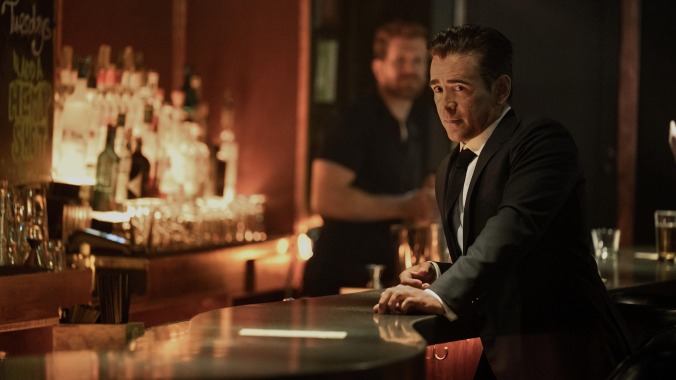Sugar review: Colin Farrell channels Marlowe and Spade in a sun-washed neo-noir
The actor plays a hard-drinking, film-loving snoop in Apple TV+'s series

Los Angeles, now-ish. One of Hollywood’s most famous producers has a “bum ticker” and a missing granddaughter. Luckily, the best finder in town is on the case, all gruff and wry voiceover narration, late-night whiskey in a glass with no rocks, forever tending a battle-wounded conscience while a mournful sax purrs.
But Colin Farrell’s Sugar is “one of the good guys”—tough, unflappably smart-alecky, yet is made nervous by guns. He grumbles throaty in PI cliches—“I’m not supposed to get this involved,” “I think the lady needs a drink”—and yet appears unable to properly maintain a buzz. He speaks Arabic to a driver, helpfully offering up a doctor connection; he speaks Spanish to his room server, asking about her family; he starts with a handshake, and then offers money, a phone, and a potential restart of a homeless man’s life, seemingly on a whim, fitting in the time around his scheduled binge and hookup. On said hookup, he basically recreates the Curb Your Enthusiasm bit about negotiation and a pre-sex consent tape. Who is this, James Bond after an ayahuasca retreat? Is this all maybe making fun of neo-noir? What exactly is going on?
A whole lot. Much more than the plot, which, well, forget it, it’s Chinatown. But first, Sugar (which premieres April 5 on Apple TV+) opens in Tokyo, in black-and-white, rife with labored style: hazy washes, close-ups, steadicams, fisheyes, an effortful aesthetic not to be gleaned from the trailer. Farrell looks fresh and hungry for a small-screen redo of True Detective season two: Calvin Klein ad classic, Savile Row suit, clean cut, and possibly reverse aging. He’s even apologetic for the pain he’s caused. “I don’t like hurting people, it’s true.” He kicks ass, he catches a fly with chopsticks, he savors hard and deep the taste of the top-shelf stuff, neat. But he seems most piqued by being able to get home, to sunny L.A., to his back issues of Sight And Sound and American Cinematographer.
“This is a tough business, but steady.” And which business is that? Sugar seems to enjoy seeing himself enmeshed in the industry of Hollywood. He rebuffs being called a buff, instead considering it “more like an addiction.” Throughout, fragmentary flashbacks are relentless, unapologetic, and quite cool. We see endless cuts of Bogart, clips of The Big Heat, Double Indemnity, The Third Man. He late-night screens Cassavetes’ Minnie And Moskowitz. He talks about The Thing like an effusive hipster film undergrad after two Manhattans. And we’re along for the ride to see him aping his big-screen dreams, daydreaming through the thickets of investigator life, really playing at playing a lone wolf snoop. Though he’s actually very good—and looks even better, framed by palm trees and sunny washes and a jazzy, jivey rhythm hard to turn down or away from. The simple slam of a classic car’s door, the walk up to a house in the Hills, the neon of an old bar, the camera always lingering one loving beat too long — against it all he easily conjures a less rumpled Elliott Gould, a less swaggery Gene Hackman, most any good tough from any Raymond Chandler.

 Keep scrolling for more great stories from The A.V. Club.
Keep scrolling for more great stories from The A.V. Club.